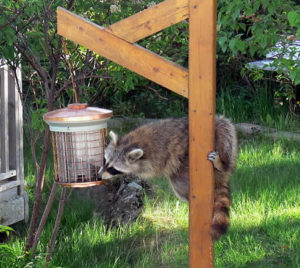 We are often asked why so many raccoons live in neighborhoods and urban environments. The main answer is a high volume of food availability. In a natural setting these animals must constantly scavenge for anything they can find to eat such as; fruits, nuts, crayfish, freshwater mussels, eggs, and dead animals. This requires that each raccoon have a large territory in order to forage the volume of food required to keep itself fed, and it will defend that territory from other raccoons looking to steal a meal.
We are often asked why so many raccoons live in neighborhoods and urban environments. The main answer is a high volume of food availability. In a natural setting these animals must constantly scavenge for anything they can find to eat such as; fruits, nuts, crayfish, freshwater mussels, eggs, and dead animals. This requires that each raccoon have a large territory in order to forage the volume of food required to keep itself fed, and it will defend that territory from other raccoons looking to steal a meal.
In an urban setting the food is more easily available and found in larger quantities. Trash day is a prime example. Every week trash cans and dumpsters are filled with food scraps and waste that are easy pickings for raccoons. There are also bowls of pet food left out overnight, and birdfeeders to help fill their bellies on a nightly basis. Add into that all the fast food wrappers, and soda cups left on the side of road and now you can start to see that our neighborhoods are like a giant buffet.
This massive food surplus allows the areas around our homes to support a huge population of raccoons. The excess food and the concentrated location means these animals need smaller territories and they become more tolerant of other raccoons as the competition for resources decreases. This leads to negative interactions with humans. Destruction of property, and exposure to diseases from the raccoons and their feces. They are known to use the same locations for their waste, these are referred to as latrine sites and could be out in a wooded spot in the neighborhood or a child’s playground or sandbox.
To reduce the risks of disease transference to humans, pets, and other wildlife a raccoon control program is always recommended to keep the population in a healthy balance. The goal of our programs are not to eliminate the population but to remove targeted numbers to allow the natural balance to remain and reduce the risks of disease and damage.
Predator Control Services is committed to offering the highest quality programs for the safe and humane removal of wildlife for all types of environments and both residential and commercial properties. We are Georgia’s Trapping Experts.
Recent UGA study on the passing of disease from raccoon to humans: Deadly raccoon roundworm can infect humans without symptoms.

Recent Comments